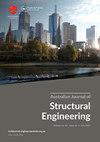Comparative study of analytical/semi-analytical methods for prediction of axial strength of cold-formed steel wall panels with sheathing
IF 0.9
Q4 ENGINEERING, CIVIL
Australian Journal of Structural Engineering
Pub Date : 2022-04-03
DOI:10.1080/13287982.2021.2012388
引用次数: 2
Abstract
ABSTRACT Load-bearing cold-formed steel (CFS) wall panels comprise of a stud (C-section), track (U-section) and sheathing. Sheathing is fastened to the CFS frame with self-drilling screws, which has an effect on the axial load-carrying capacity of panels. Experiments are complex and often expensive as they require use of different resources (raw material, manpower etc.). Therefore, conducting experiments is not always possible and an efficient design tool is necessary. Few studies are present in literature on comparing the effectiveness of available design methodologies. For the first time, an attempt is made to compare all the three (03) presented mathematical models together to predict the axial strength of CFS wall panels with sheathing. The present study examines the effectiveness of such analytical/semi-analytical tools, namely, Rayleigh-Ritz (R-R) method, Differential equation of equilibrium (DEEq) method and Constrained and Unconstrained Finite Strip Method – Direct Strength Method (CUFSM-DSM) for estimation of axial load-carrying capacity of sheathed CFS panels. The results show that CUFSM-DSM can be utilized meritoriously for evaluation of sheathed CFS wall panels.带护套冷弯型钢墙板轴向强度预测的解析/半解析方法比较研究
承载冷弯型钢(CFS)墙板由螺柱(c型)、轨道(u型)和护套组成。护套是用自钻螺钉固定在CFS框架上的,这对面板的轴向承载能力有影响。实验是复杂的,往往是昂贵的,因为它们需要使用不同的资源(原材料,人力等)。因此,进行实验并不总是可能的,一个有效的设计工具是必要的。文献中很少有关于比较现有设计方法有效性的研究。本文首次尝试将3种(03)数学模型进行比较,以预测含护层的CFS墙板的轴向强度。本研究考察了这些分析/半分析工具的有效性,即瑞利-里兹(R-R)方法、平衡微分方程(DEEq)方法和有约束和无约束有限条法-直接强度法(CUFSM-DSM),用于估计受护CFS板的轴向承载能力。结果表明,cussm - dsm可以很好地用于护套CFS墙板的评价。
本文章由计算机程序翻译,如有差异,请以英文原文为准。
求助全文
约1分钟内获得全文
求助全文
来源期刊

Australian Journal of Structural Engineering
ENGINEERING, CIVIL-
CiteScore
2.50
自引率
0.00%
发文量
31
期刊介绍:
The Australian Journal of Structural Engineering (AJSE) is published under the auspices of the Structural College Board of Engineers Australia. It fulfils part of the Board''s mission for Continuing Professional Development. The journal also offers a means for exchange and interaction of scientific and professional issues and technical developments. The journal is open to members and non-members of Engineers Australia. Original papers on research and development (Technical Papers) and professional matters and achievements (Professional Papers) in all areas relevant to the science, art and practice of structural engineering are considered for possible publication. All papers and technical notes are peer-reviewed. The fundamental criterion for acceptance for publication is the intellectual and professional value of the contribution. Occasionally, papers previously published in essentially the same form elsewhere may be considered for publication. In this case acknowledgement to prior publication must be included in a footnote on page one of the manuscript. These papers are peer-reviewed as new submissions. The length of acceptable contributions typically should not exceed 4,000 to 5,000 word equivalents. Longer manuscripts may be considered at the discretion of the Editor. Technical Notes typically should not exceed about 1,000 word equivalents. Discussions on a Paper or Note published in the AJSE are welcomed. Discussions must address significant matters related to the content of a Paper or Technical Note and may include supplementary and critical comments and questions regarding content.
 求助内容:
求助内容: 应助结果提醒方式:
应助结果提醒方式:


